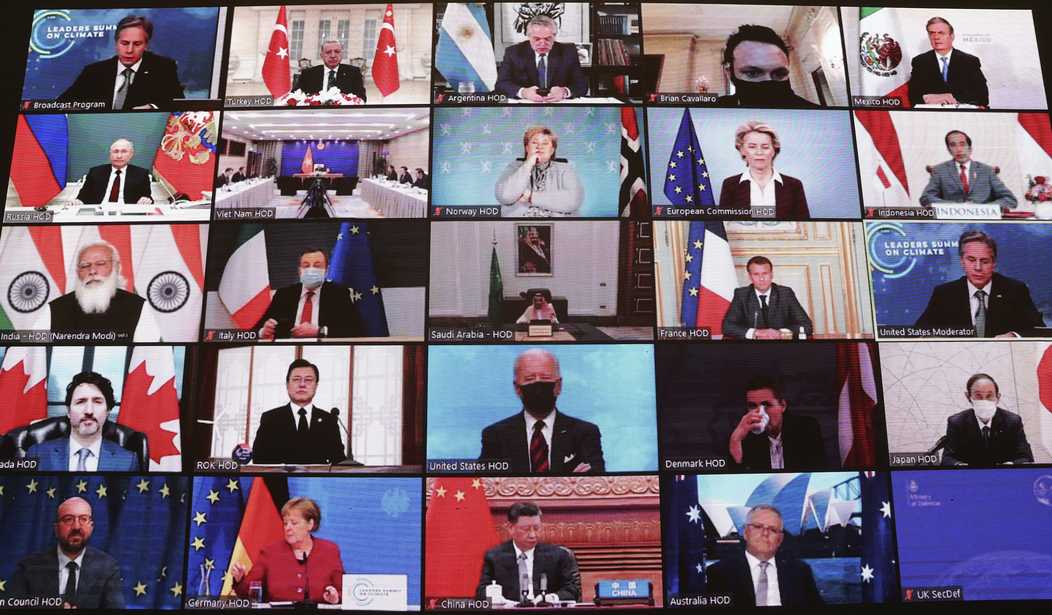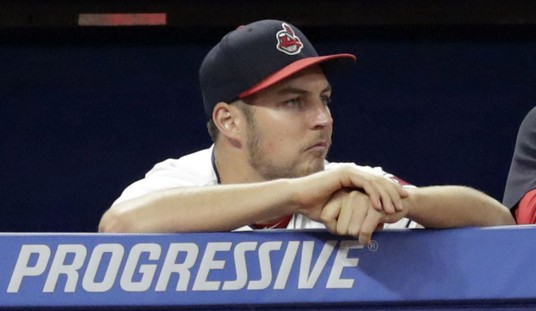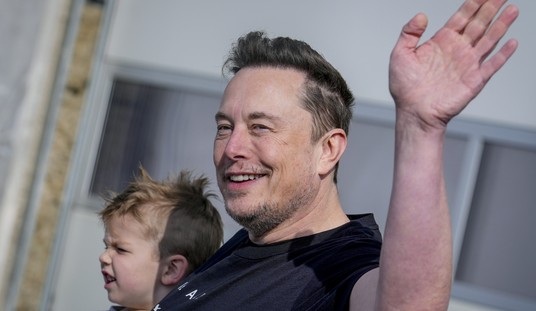Despite his vow to “build back better,” China is forcing all of Joe Biden’s moves. The Asian giant’s decision to pursue its own climate policy, consisting largely of more industrialization with green trimmings, effectively kills the Paris accords, so long a part of the progressive platform. How could it not? Beijing produces more emissions than the EU and U.S. combined.
“In 2019, China’s emissions not only eclipsed that of the US — the world’s second-largest emitter at 11% of the global total — but also, for the first time, surpassed the emissions of all developed countries combined … When added together, GHG emissions from all members of the Organization for Economic Cooperation and Development (OECD), as well as all 27 EU member states, reached 14,057 MMt CO2e in 2019, about 36 MMt CO2e short of China’s total.”
Not only is climate change DOA, but the post-WW2 alliance structure is in the ICU. China’s naval expansion pushed Washington to undercut the planned Australian purchase of French conventional submarines in favor of U.K.-U.S. nuclear designs. “For Mr. Macron, the [AUKUS] submarine debacle demonstrates that the NATO alliance is debilitated to the point of dysfunction through lack of trust. The glue has gone. Without transparency — and in the submarine deal there was none — alliance, in the French view, becomes an empty word.”
The “glue” that held NATO together was fear of the Soviet bear. But that once formidable bruin is mangy and supplanted by the much more formidable CCP dragon. The decline of European alliances reflects the strategic primacy of Asia. The irony was that up until Kevin Rudd became PM, Australia actually wanted to become part of Asia. But Chinese expansionism changed all that and stirred in the Aussie breast the old but not wholly forgotten memories of alliances with the English-speaking world.
But the ultimate blow to Biden’s Global World has been to its economic underpinnings. China had been going broke gradually, then all of a sudden. “The roots of the crisis date to [Chinese] tax reforms in 1994 which bolstered central government coffers but left local governments reliant on land financing for revenue.” By China’s own reckoning, the country’s vaunted economic growth rested on three huge bubbles that, once exploded, could threaten the Party’s own legitimacy. “This year, Xi has set out to reform the ‘three huge mountains’ of housing, education and healthcare to rein in soaring costs for city dwellers as a way to shore up legitimacy as the ‘people’s leader’, analysts said.”
The Communist Party encouraged the bubbles in order to tax them. But now, with the stream of new business finally exhausted and the entire edifice threatening to collapse like a house of cards, Chairman Xi has suddenly rediscovered Maoism.
For a long time, analysts chalked Chinese President Xi Jinping’s homages to Mao Zedong to “political stagecraft,” but a Wall Street Journal examination of Xi’s recent writings and speeches suggests they should be taking him much more seriously. It now appears Xi is “forcefully” trying to get China back to Mao’s socialist vision, the Journal writes….
“Xi does think he’s moving to a new kind of system that doesn’t exist anywhere in the world,” Barry Naughton, a China economy expert at the University of California, San Diego, told the Journal. “I call it a government-steered economy.”
Like Indiana Jones, Xi is pursued by three giant rocks and hopes to reach the socialist bunker leaving Western markets to take the brunt of the impact. As Jason Zweig observed, it was too much to hope that Wall Street should have known better.
On Wall Street, hype almost always leads to heartache, and the experience of people who have hopped onto the bandwagon of investing in China has so far been no exception. ..
Late last year, as my colleagues Jing Yang and Lingling Wei reported, President Xi personally intervened to squelch the initial public offering of Ant Group Co., shortly before the financial firm could launch what would have been the largest IPO in history.
Since then, the government has slammed Alibaba Group Holding Ltd. with a $2.8 billion antitrust fine that state media called “also a kind of love.” It blocked Didi Global Inc. from adding new customers just days after the ride-hailing firm went public on the New York Stock Exchange. In July, shares in New Oriental Education & Technology Group Inc. and TAL Education Group fell roughly 70% in two days after Communist Party authorities issued an edict that would force tutoring services for children to be run as not-for-profit operations. The companies themselves never saw it coming, and Wall Street analysts had been blithely touting the stocks.
The fate of large parts of the U.S. economy consequently depends not on regulatory actions in Washington but on bureaucratic decisions in China. The global world that Joe Biden had hoped to inherit is falling apart right under him, like a comedy car shedding its parts as it rattles down the road. As Niall Stanage of the Hill put it, “President Biden’s biggest vulnerability isn’t any single issue. It’s the risk that he could be seen as losing control of events.”
The dissolution of the landscape means the Biden administration isn’t plagued by any one malady anymore but by multiple organ failure. The Guardian writes, “Is Joe Biden failing? Less than nine months into his presidency, rising numbers of Americans and not a few foreign allies appear to think so. Polls last week by Gallup and Rasmussen put his national approval rating at minus 10 points. His overall poll average is minus 4. That compares with a positive approval rating of 19 points in January when he took office.”
Numerous factors are contributing to what is starting to look like a presidential meltdown. At home, Biden’s didactic handling of the pandemic attracted growing criticism during a summer Covid surge. Continuing mistreatment of migrants on the Mexico border, which he promised to end, is a lose-lose issue for him. A Biden-backed police reform bill, prompted by the death of George Floyd, was killed off in Congress last week.
Abroad, Biden’s reputation for foreign policy competence was shattered by the Afghan withdrawal debacle and the loss of American and Afghan lives. Normally loyal foreign allies complained noisily about chaotic mismanagement – and voters listened. The row with France over a US-UK-Australia defense pact (Aukus) has deepened disillusion over his commitment to multilateralism.
Biden’s practiced use of longstanding connections, personal acquaintance and avuncular charm to get his way brings diminishing returns. China’s president, Xi Jinping, reportedly refused a summit meeting. Russia’s ill-disposed leader, Vladimir Putin, met him in Geneva, banked the kudos, then carried on regardless. Biden waited days for a phone call last week with France’s pissed-off president, Emmanuel Macron.
At the heart of the Biden collapse is one major factor: Joe had counted on presiding over a world that no longer exists. He is king, but the king of vanishing empire. The situation can no longer be salvaged by tinkering, but only through a radical paradigm shift that the aged occupant of the White House is neither prepared nor able to undertake. Who can deal with the world as it now exists? That is what Western publics are waiting to find out.
Books: Heaven, Hell, and Purgatory: Rethinking the Things That Matter Most Kindle Edition by Jerry L. Walls. Will heaven be boring? How can a good and loving God send people to hell? Is there such a place as purgatory?









Join the conversation as a VIP Member